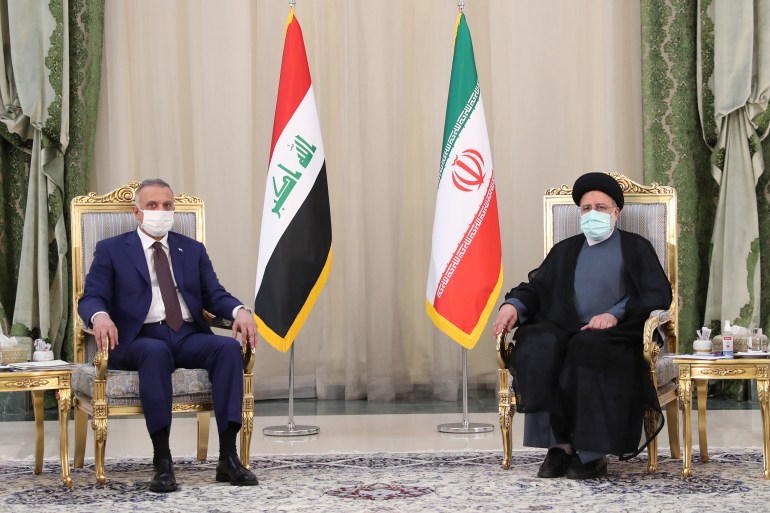Iraqi Prime Minister Mustafa Al-Kazemi survived a "failed assassination attempt" by a "drone bomb" that targeted at dawn today, Sunday, his residence in Baghdad, in an attack that no party has yet claimed.
Al-Kazemi is a former head of the intelligence service, a former journalist and a skilled negotiator whose political future became unknown after the early parliamentary elections that took place on the tenth of last October.
I was and still am a redemption project for Iraq and the people of Iraq. The missiles of treachery will not discourage the believers, and a hair will not be shaken in the steadfastness and insistence of our heroic security forces to preserve the security of the people, achieve the right and set the law in place.
I am fine, praise be to God, among my people, and I call for calm and restraint from everyone, for the sake of Iraq.
— Mustafa Al-Kadhimi Mustafa Al-Kadhim (@MAKadhimi) November 7, 2021
Al-Kadhimi, born in Baghdad in 1967, assumed the presidency of the Iraqi National Intelligence Service in June 2016, at the height of the battles against the Islamic State.
During his presence in this strategic location, which kept him out of the limelight, he weaves several ties with dozens of countries and agencies that work within the international coalition led by the United States.
In his early days, Al-Kazemi, who studied law in Iraq, was a journalist and activist against the late Iraqi President Saddam Hussein from Europe, which he sought refuge in to escape the regime.
He lived for years in exile, but he did not join any of the Iraqi political parties.
From Baghdad and London, Al-Kazemi ran the Humanitarian Dialogue Foundation, an independent organization that seeks to bridge the gaps between societies and cultures, and establish dialogue as an alternative to violence in resolving crises.
He also worked as a columnist and editor-in-chief of the Iraq section of the Monitor International website, and his articles focused on consolidating the spirit of social peace in the country.
During his career, he published several books, the most prominent of which is "The Question of Iraq: Reconciliation between the Past and the Future".
After the American invasion of Iraq and the overthrow of Saddam Hussein's regime in 2003, Al-Kazemi returned to Iraq to co-found the Iraqi Media Network, coinciding with his role as executive director of the "Iraqi Memory Foundation", an organization established for the purpose of documenting violations that occurred during the Baathist era (1968-2003). .
In 2016, it was a surprise that the then Prime Minister Haider al-Abadi appointed a columnist and human rights activist to head the intelligence service, in addition to his role in combating terrorism and smuggling of all kinds. Al-Kazemi developed his talents as a negotiator and mediator.
A politician close to Al-Kazemi says, "He is a figure who does not antagonize anyone, has a pragmatic mentality, and has relations with all the main players on the Iraqi arena, a good relationship with the Americans, and a relationship that has recently returned to normal with the Iranians."
Al-Kazemi is a personal friend of Saudi Crown Prince Mohammed bin Salman (Reuters)
From Tehran to Riyadh
Al-Kazemi knows how to be a friend of two enemies between them. With his return to rapprochement with Tehran, he did not forget his old friendships.
During a visit to Riyadh, Tehran's regional rival, after he assumed Iraq's prime ministership in May 2020, he was seen embracing his personal friend, Crown Prince Mohammed bin Salman, at length.
As a result of these ties woven east and west, he has tried in recent months to make Baghdad enjoy an international status.
The Iraqi capital was the scene of closed negotiations between Tehran and Riyadh, and witnessed a historic visit by Pope Francesco last March, and last August hosted an international conference, in which French President Emmanuel Macron participated.
A Western observer believes that Al-Kazemi "embodies the return of a sovereign Iraqi state."
Al-Kazemi was keen on rapprochement with Tehran (French)
However, pro-Iranian factions accuse him of being complicit in the assassination of the Quds Force commander in the Iranian Revolutionary Guard, Qassem Soleimani, and Abu Mahdi al-Muhandis, the deputy head of the Iraqi Popular Mobilization Forces, at the hands of the United States in Baghdad in early 2020. Therefore, he had to re-improve his image in front of Tehran.
Internally, Al-Kazemi faces opposition from an alliance of pro-Iranian factions that are affiliated with the security forces.
Al-Hashd supporters demand a complete withdrawal of US forces from Iraq, and they continue to pressure Al-Kazemi in this regard.
These supporters also hold the Al-Kazemi government responsible for the "fraud" in the recent early parliamentary elections, in which the number of seats for the Al-Fateh bloc led by Hadi Al-Amiri, the representative of the Popular Mobilization, decreased.
Al-Kazemi is not an official candidate to take over the position again, but some political officials see it as a consensual solution if negotiations between the political forces falter.
After obtaining the support of the Iraqi political class that has monopolized power for 16 years, Al-Kazemi was forced to re-weave the ties that were severed with angry Iraqis who demonstrated for months against "corrupt" politicians.
He also tried to negotiate the country's vital economic channels, with the collapse of global oil prices, in addition to the issue of US exemptions for Iraq from sanctions on Iran.
"He is a prominent negotiator and a cunning player," says Toby Dodge, director of studies at the Middle East Institute at the London School of Economics, but he adds that "Iraq today is on time, and the risks have increased a lot."

